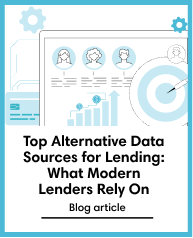Alternative Data
Aug 11, 2022
Repurposed: 4 Myths about Alternative Data Busted
Subscribe to our newsletter
In this article, we will explain the four typical misconceptions about alternative credit scoring. We will uncover why these statements are false and further explain how alternative data helps build a comprehensive understanding of a person’s risk profile.
Lending to individuals who, for different reasons, are not yet part of mainstream financial services has been a constant challenge. How do you extend loans to borderline applications? What data do you use to profitably extend credit to thin-file, no file, unbanked and underbanked customers? How do you turn consumers misclassified by traditional credit assessments as ineligible for loans into profitable customers? How do you give credit to customers that deserve credit but are still outside of the system?
Predictive insights into these questions are crucial in improving lending decisions. However, traditional credit scores fail to provide a comprehensive picture of an individual’s creditworthiness. This negatively impacts credit decisions, including prescreening and approval process, credit line allocation, and account management.
The way out? Alternative credit scoring based on privacy consented and anonymous smartphone and web metadata. This approach helps gain deeper behavioural insight and provides unmatched speed and predictability for better lending decisions, potentially helping raise the credit scores of people with lower income and customers who are typically locked out of traditional credit lines. This, in turn, helps turn them into valuable customers and grow overall credit approval rates. However, despite the obvious benefits of using alternative data for credit scoring, misconceptions concerning the approach prevail. Read on to know more about the top four alternative credit scoring myths and why they are not true.

Myth #1: Alternative credit data is unreliable
Since traditional credit data has been the quintessential go-to for decades, it has reigned supreme as the reliable source for lenders. However, in recent years, opinions about credit scoring resources have changed. According to credit information provider Experian, 89% of lenders agree that alternative credit data allows them to extend credit to more consumers. Alternative data which assist in credit scoring can help lenders get a sense of the loan seeker’s financial reliability and willingness to repay. Whether combined with traditional credit bureau scores or used alone, alternative credit scores provide a more holistic picture of the loan seeker’s creditworthiness.
Moreover, rapid advances in artificial intelligence (AI) help convert alternative metadata into reliable credit scores. With alternative credit data, creditors can identify new lending opportunities, improving overall portfolio performance.

Myth #2: Alternative consumer data is only used for consumer financing
Alternative credit data goes far beyond consumer financing. Advances in fintech lending and the use of big data have changed the way small businesses secure financing. After the 2008 financial crisis, credit scores of small businesses, which traditional financial institutions left behind, took a significant hit. That’s when fintech lenders became an increasingly popular financing resource for small shops in need of a loan. Fintech lenders use a variety of alternative data sources, including digital data, PoS information, and surrogate data such as utility and bill payments, so that previously underserved consumers now have access to credit.

Myth #3: Alternative credit data violates customer privacy
For better credit decision making, every bit of information counts – and applicants are more than willing to share this data. An Experian survey found that 80% of consumers are willing to provide additional information to a lender if it meant increased chances for approval or improved interest rates on credit. With increasing data privacy regulation and protection, smartphone metadata with granted permission allows consumers to choose to share their data for specific credit scoring purposes without worrying about data breaching and violations of their privacy. The customer is in the driving seat.

Myth #4: Alternative credit data means only social media data
Though several lenders are exploring social media scoring in their credit underwriting process, it is not the only data available for credit scoring. For instance, at credolab, we leverage bank-grade algorithms to analyse nearly 10 million features from opt-in web and smartphone metadata with granted permission to find the most predictive behavioural patterns before converting them into credit scores. This enables any financial institution, even Buy Now Pay Later (BNPL) players, to assess their applicants' risk level, repayment behaviour, and creditworthiness with greater accuracy before granting them credit.
The future of alternative data
Not too long ago, most traditional lenders had no grasp of how to leverage data from rental history, utility payments history, bank accounts or social media to make credit decisions. As a result, millions lacked access to credit. According to a 2018 World Bank report on the use of financial services, globally, 1.7 billion adults remain unbanked, yet two-thirds of them own a mobile phone that could help them access financial services. The report further states that alternative data could help provide formal financial services to up to 100 million more adults globally.
Alternative data is definitely finding its place alongside traditional qualifiers for credit. A start to reducing credit invisibility, modern credit underwriting processes will increase credit approval traction and lead to a shake-up of the credit industry and its time-tested processes.
Interested in knowing more about alternative credit scoring? Read on to understand how new credit scores determine a clients' creditworthiness

Access data insights solutions that deliver growth - Fraud detection | Credit scoring | Marketing segmentation. Helps you say "YES" more confidently to more customers!
Learn more about credolab's products and possibilities with our features through our Blog section, and feel free to share our content with your team!
Follow us on social or get in touch today: Book a meeting | Blog | LinkedIn | Twitter | Contact Us





